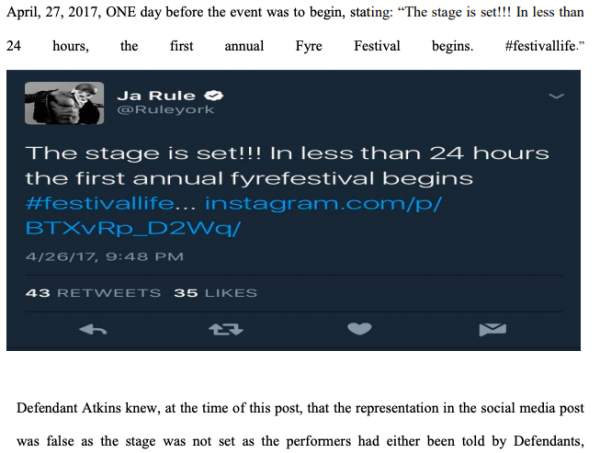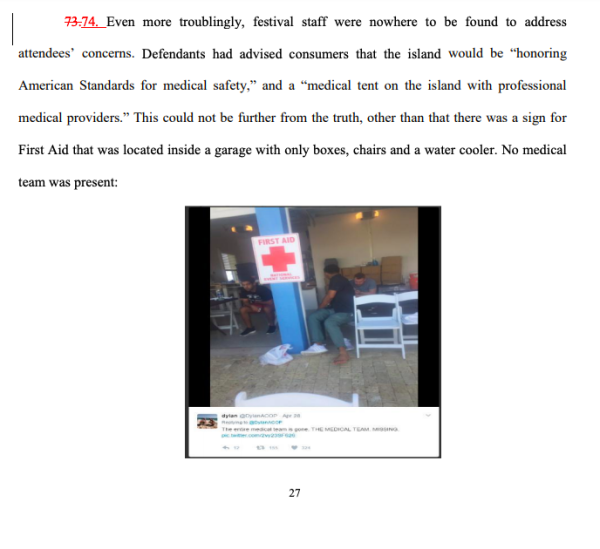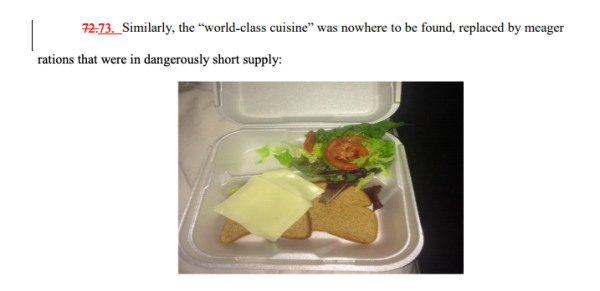(AllHipHop News) Rap star Ja Rule may have rejoiced a little too early when he was dismissed from a $100 million lawsuit over the disastrous Fyre Fest.
A group of fans have filed an amended complaint seeking to have Ja Rule re-named as a defendant in the class-action lawsuit.
The judge ruled that insufficient evidence was provided to prove that Ja Rule and Grant Margolin were involved in a fraud to deliberately deceive the public.
On October 10th, lawyers for Geragos’ firm filed their amended complaint with evidence they claim proves Ja Rule and Margolin were in on the scam.
Lawyers for the plaintiffs argue Ja Rule was promoting the doomed party just 24-hours before the entire event was scrapped altogether even though he had told the artists to stay away.

Ticket holders paid between $1,000 and $100,000 to attend the event, which was supposed to start on April 28, 2017.
Guests arrived on Great Exuma island in The Bahamas to discover the luxury accommodation they were promised did not exist.
Instead of partying with social media influencers like Kendall Jenner and rappers like Migos and Pusha T, the unlucky patrons in class action lawsuit were forced to stay in disaster relief tents until they could be shutted off the island.

“Defendant Atkins knew, at the time of this post, that the representation in the social media post was false as the stage was not set as the performers had either been told by Defendants, including Atkins, not to attend or had cancelled,” said attorney Ben J. Meiselas, who is representing the angry festival goers on behalf of Geragos’ law firm.
Furthermore, the amended complaint points to Ja Rule’s statements he made in “Fyre Fraud,” one of the two documentaries about the failed festival.
“Atkins clearly held himself out as co-founder of the Festival, and the public reasonably interpreted his public statements regarding the Festival as a reliable source of information,” Meiselas said.
To make matters worse, lawyers representing disgruntled fans say they have proof Ja Rule called some of the rappers he was friendly with to give them a heads up about the impending disaster.

“Troublingly, before Plaintiffs and other ticketholders had arrived, these Defendants urged artists to not attend due to the dangerous and uninhabitable conditions that were present at the event venue… Defendant Atkins knew, at the time of this post, that the representation in the social media post was false as the stage was not set as the performers had either been told by Defendants, including Atkins, not to attend or had cancelled,” according to Meiselas.
But the same courtesy was not given to the people who had shelled out thousands of dollars to attend the Fyre Festival.
As a result of Ja Rule’s actions, several people who bought tickets for the Fyre Festival claim they did so after looking at the rap star’s social media posts.
One plaintiff claims he made his decision to purchase tickets to the doomed festival solely based on the messages posted to Ja Rule’s Twitter account.
“As a result of relying on the tweet, Mr. Abbas Ali had to spend a frightening evening on the island, where the Fyre Festival campsite was full of frantic attendees who were fighting over tents, where there was a basic lack of provisions, and where attendees were exposed to the elements,” attorney Ben J. Meiselas wrote.

But the plaintiffs in the class-action lawsuit say Ja Rule is simply trying to cover his tracks to avoid being a part of the $100 million lawsuit.
“Defendant Atkins was the founder, funder, organizer, chief artistic leader and front and center promotor of the Fyre Festival. He was also a controlling owner and officer of Fyre Media and Fyre Festival LLC. In the aforesaid roles, he directed and was actively involved in policies and business strategy, including marketing, advertising, and promotion content, strategy, and delivery,” said the plaintiff’s attorney Ben J. Meiselas.
The lawsuit also says the Bahamian government has banned Ja Rule from ever producing an event on the island again.
The Fyre Festival organizers are accused of fraud, breach of contract, breach of covenant of good faith, and negligent misrepresentation over the ruined festival in the class-action lawsuit filed by Geragos and his office.